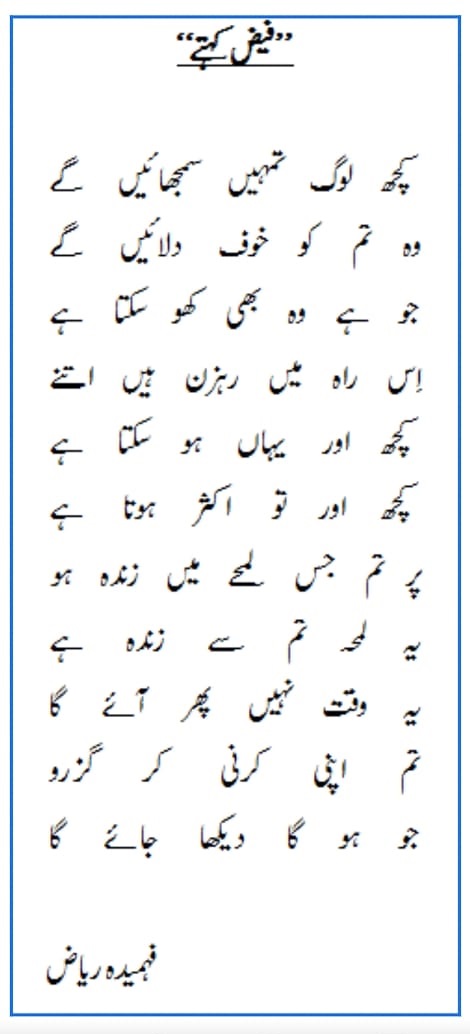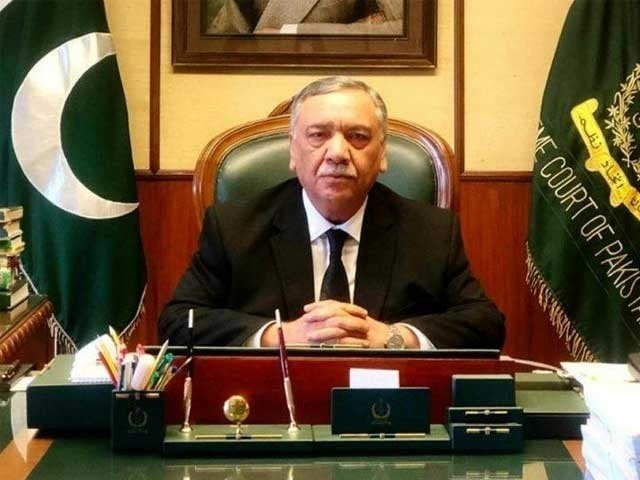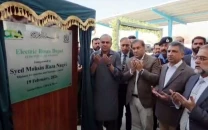CJP Asif Saeed Khosa. PHOTO: EXPRESS
ISLAMABAD:
After the tumultuous last month of his brief stint as the Chief Justice of Pakistan, which literally stirred up a storm in the country, Asif Saeed Khosa bowed out on Friday while summing up the guiding philosophy of his professional career in a poem by the progressive feminist poet Fahmida Riaz: “Follow your conscience, do what is right; Unfazed, undeterred by consequences.”
The last two judgments of the superior judiciary involving a former and an incumbent army chief, especially a bizarre rider to the death sentence awarded to Gen (retd) Pervez Musharraf, have shook the country, triggering an outcry on social media.
“A malicious campaign has been initiated against me and the judiciary in general. The allegations are baseless and incorrect. We know the limits of our powers and we know that the truth shall always prevail,” said Chief Justice Khosa, who retires today, while addressing a full-court reference at the Supreme Court on Friday.
Attendees at the reception included all apex court judges, the vice-chairperson of Pakistan Bar Council, the president of the Supreme Court Bar Association, Attorney General for Pakistan Anwar Mansoor Khan, and others.
Justice Khosa’s remarks were partly in reference to a claim by a top government law officer that the outgoing chief justice, in a candid chat with media persons, had admitted that he had influenced the verdict of the special court against former army chief Gen (retd) Musharraf.
Musharraf has been sentenced to death by the three-judge special court for abrogating the Constitution by proclaiming emergency rule in the country in Nov 2007. The grisly ‘three-day hanging’ rider to the sentence in the detailed judgment by the presiding judge, Justice Waqar Seth has drawn scathing criticism by the government and the military.
CJP-designate Khosa to sparingly use suo motu powers
In his address at the full-court reference, Justice Khosa – who remained the chief justice of Pakistan for a little over 11 months – said that he always did what he “thought was right and was worth doing”. “And it did not matter to me as to what the reaction or consequences would or could be,” he added.
The outgoing top judge said a student of law might find that throughout his 22-year-long career that he had tried to consolidate legal knowledge on different aspects and had also made attempts to resolve conflicting opinions on diverse legal issues.
“Initially, that period appeared to be too short to make any meaningful contribution, but in hindsight, it appears to be long enough for taking some critical steps and for initiating reforms in the justice sector,” he added.
Justice Khosa went on to list matters he had prioritised during his short stint as the chief justice of Pakistan.
“The image of this court as a dignified judicial forum sitting at the apex of judicial hierarchy was maintained; the principle of separation of powers was adhered to; judicial restraint was exercised; and dignity and respect ensured for all appearing before the court as lawyers, litigants or officials,” he said.
“An all-out effort was made to put our own house in order with an approach focusing mainly on improving the justice delivery system,” he added. “The principle of falsus in uno, falsus in omnibus [false in one thing, false in everything] was reintroduced in our legal system because in the absence of truthful testimonies justice may only be illusory.”
He said that he had ensured to effectively discourage the rampant practice of seeking and granting adjournments so as to minimise delays in the disposition of cases.
With Justice Khosa in the office, the apex court adopted video-linkage to facilitate cases at the provincial registries – saving time and cutting down travel expenses. A state-of-the-art research centre was established at the Supreme Court; the website was upgraded; a mobile application was launched and an e-kiosk was installed near the bar room in Islamabad to assist lawyers and litigants. An artificial intelligence project is also in the works to facilitate the judges.
“The Supreme Court Estacode has been compiled and launched consolidating in one book all the constitutional and legal provisions relevant to this court and all the notifications, circulars, orders, rules and instructions governing the practices and procedures of the court,” the outgoing chief justice said.
The highlight of Justice Khosa’s tenure was clearing out of 25-years’ backlog of criminal appeals pending before the apex court. “During the last 235 working days, as many as 15,555 cases have been decided by this court despite many larger benches of the court having remained busy with some important cases consuming a lot of time,” he added.
“A working paper containing some proposed amendments to the Supreme Court Rules, 1980 so as to regulate suo motu exercise of this court’s jurisdiction under Article 184(3) of the Constitution and to provide for an Intra-Court Appeal in that respect has been presented before the full court and the same is under active consideration.”
Special benches have been created to expedite tax, revenue and banking cases at the high courts. While model courts have decided 116,407 cases in 212 working days. “In dozens of districts in the country zero pendency of many categories of cases has been achieved – including cases of murder and narcotics.
“Special Courts for trying cases of gender-based violence have been established in every nook and corner of the country after imparting training to about 100 serving judicial officers with the assistance of the Asian Development Bank,” Justice Khosa said.
The Federal Judicial Academy was turned into a centre of excellence “imparting training to judicial officers, court staff, prosecutors, investigators, and young lawyers”. The Law & Justice Commission of Pakistan was rejuvenated, which is working on initiatives such as the Police Reforms Committee, chaired by the chief justice of Pakistan and comprising all the IGPs and some reputed retired police officers.
Justice Khosa’s term also saw the establishment of the office of Superintendent of Police (Complaints) in every district on the basis of a decision of the Police Reforms Committee. “It has provided a system of internal accountability within the police department and aggrieved persons now have a free forum of redressal of their grievances against the working of the police and they now don’t have to approach a court of law for that purpose,” he said.
Known as a literary genius, Justice Khosa concluded his speech with a poem, ‘Faiz Kehte’, by the late progressive feminist poet Fehmida Riaz which, according to him, sums up the philosophy that had guided him throughout his career:

‘Learn to compromise’, some may advice,
‘Scary the consequences’, they may apprise;
Robbed you may be of all you possessed,
Strewn with robbers is this perilous quest;
Tragedies, mishaps may befall, beware!
For tragedies often befall those who dare;
Cherish every priceless moment thou have,
For a moment’s eternity is thy breath’s slave;
This moment shall pass, not to come again,
Do what thou think is right – worth doing,
Fear not tomorrow, defiance goes not in vain”
Sindh plagued by corruption, says Justice Gulzar
Born in the southern Punjab district of Dera Ghazi Khan on Dec 21, 1954, Asif Saeed Khosa obtained his law degree from the United Kingdom in 1976 and was considered one of the country’s top jurists on criminal law. He had replaced Justice (retd) Mian Saqib Nisar as the chief justice of Pakistan.
Justice Khosa will be succeeded by Justice Gulzar Ahmed, who is scheduled to be sworn in on Saturday as the 27th chief justice of Pakistan.
Speaking at the full-court reference, the incoming chief justice said his predecessor would remain an inspiration for the judiciary. “Clear, lucid and often sprinkled with literary allusions, Justice Khosa’s decisions have been a delight to read, for both those, within the legal profession and those without,” Justice Gulzar said.
“Especially, in the realm of criminal law, Justice Khosa has done the nation a great service by clarifying once murky questions and ensuring that the criminal defendants have access to the procedural protections, necessary for justice to prevail,” he added.
As the top judge, he said, Justice Khosa “ventured into innovations to ensure effective and fast delivery of justice.”





















COMMENTS
Comments are moderated and generally will be posted if they are on-topic and not abusive.
For more information, please see our Comments FAQ